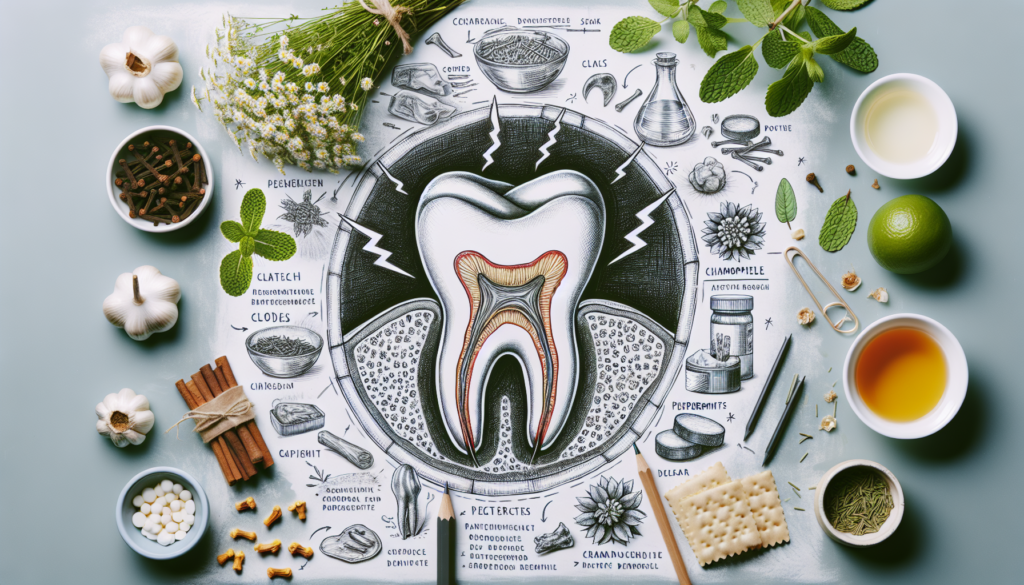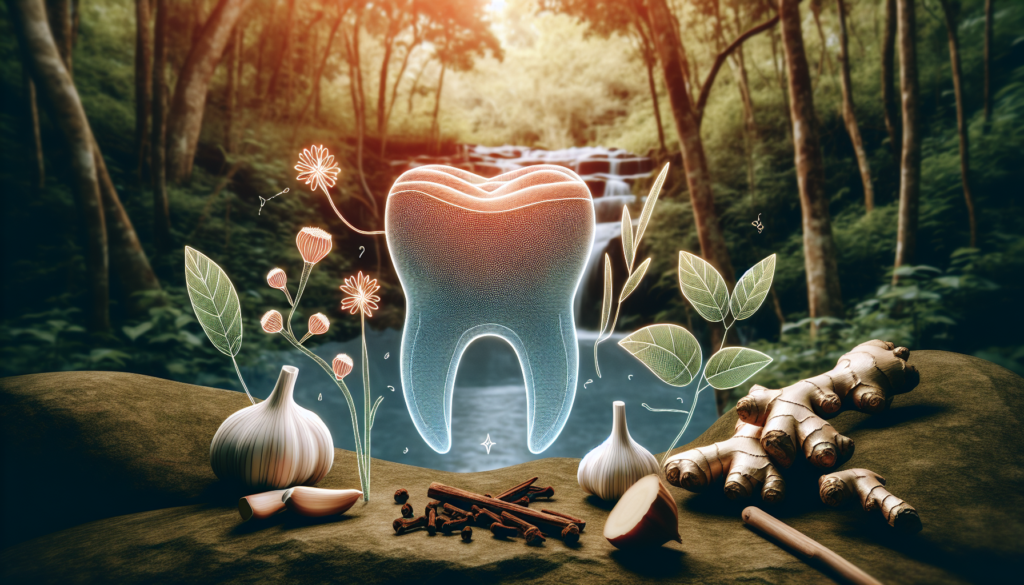Are you tired of dealing with the agonizing pain of a toothache? Look no further! In this article, we will explore a variety of natural pain relievers that can help alleviate your discomfort. From soothing herbal remedies to simple household ingredients, these remedies are not only effective but also gentle on your teeth and gums. So, forget about reaching for that bottle of painkillers and discover the power of nature’s secret cures for your toothache. Relief is just a few natural ingredients away!
Cloves
Overview
Cloves are a natural remedy that has been used for centuries to alleviate toothache pain. They contain a compound called eugenol, which acts as a natural anesthetic and has anti-inflammatory properties. Cloves have a pleasant aroma and a slightly numbing effect, making them an effective choice for temporary pain relief.
How to use
There are several ways to use cloves for toothache relief. One method is to gently chew on a whole clove, allowing the eugenol to come into contact with the affected area. This can help to numb the pain and reduce inflammation. Alternatively, you can soak a cotton ball in clove oil and apply it directly to the tooth or gum area. Be sure to dilute the clove oil with a carrier oil, such as olive oil or coconut oil, to avoid irritation.
Precautions
While cloves can provide temporary relief, it’s essential to remember that they are not a substitute for professional dental care. If you’re experiencing severe or persistent toothache, it’s important to consult a dentist, as there may be an underlying issue that needs treatment. Additionally, cloves can cause a burning or tingling sensation if used in excess, so it’s crucial to use them in moderation.
Saltwater Rinse
Overview
A saltwater rinse is a simple and effective home remedy for toothache pain. It helps to reduce inflammation and kill bacteria in the mouth, providing temporary relief from discomfort. The saltwater rinse is easy to make using ingredients readily available in most kitchens.
How to use
To make a saltwater rinse, dissolve half a teaspoon of salt in eight ounces of warm water. Swish the solution around in your mouth for about 30 seconds, focusing on the affected area. Spit out the solution and repeat several times a day or as needed. It’s important to note that the water should be warm but not hot, as hot water can worsen the pain.
Precautions
Although a saltwater rinse can provide temporary relief, it is not a substitute for professional dental care. If your toothache persists or worsens, it’s essential to seek the advice of a dentist. Additionally, excessive use of saltwater rinses can lead to dry mouth and potential damage to tooth enamel, so it’s important to use them in moderation.

Peppermint Tea Bags
Overview
Peppermint tea bags can be an excellent natural remedy for toothache relief. Peppermint contains menthol, which has a cooling effect and can provide temporary numbing and soothing properties. Additionally, peppermint has antibacterial properties that can help reduce inflammation and fight off infection.
How to use
To use peppermint tea bags, steep a tea bag in boiling water for a few minutes, then remove it and allow it to cool slightly. Gently place the warm tea bag against the affected area of the tooth or gum for about 20 minutes. You can repeat this process several times a day to alleviate the pain. Alternatively, you can also use peppermint essential oil diluted with a carrier oil and apply it to the affected area using a cotton ball.
Precautions
While peppermint tea bags can provide temporary relief, it’s important to remember that they are not a substitute for professional dental care. If your toothache persists or worsens, it’s crucial to consult a dentist. Additionally, some individuals may have allergies or sensitivities to peppermint, so it’s important to test it on a small area of the skin before applying it to the mouth.
Garlic
Overview
Garlic is a common household ingredient that can be used as a natural pain reliever for toothache. It contains a compound called allicin, which has antibacterial and anti-inflammatory properties. Garlic can help alleviate toothache pain, reduce inflammation, and fight off infection.
How to use
To use garlic for toothache relief, crush a garlic clove to release the allicin compound. Apply the crushed garlic directly to the affected tooth or gum area and leave it on for a few minutes. You can also mix crushed garlic with a small amount of salt to enhance its antibacterial properties. Alternatively, chewing on a garlic clove can help release the allicin compound and provide temporary relief.
Precautions
Although garlic can help provide temporary relief from toothache pain, it is not a substitute for professional dental care. If your toothache persists or worsens, it’s important to seek the advice of a dentist. Additionally, garlic can have a strong odor, so it’s important to rinse your mouth thoroughly after using garlic as a remedy.

Onion
Overview
Onions have natural antimicrobial and anti-inflammatory properties that can help alleviate toothache pain. They contain a compound called quercetin, which has analgesic properties and can help reduce inflammation and fight infection.
How to use
To use an onion for toothache relief, cut a small piece of onion and chew it on the side of your mouth with the affected tooth. Alternatively, you can place a small piece of onion directly on the affected area for a few minutes. The onion juice released during these processes can help alleviate the pain and reduce inflammation.
Precautions
While onions can provide temporary relief, it’s important to remember that they are not a substitute for professional dental care. If your toothache persists or worsens, it’s crucial to consult a dentist. Additionally, some individuals may have sensitivities or allergies to onions, so it’s important to discontinue use if any adverse reactions occur.
Turmeric
Overview
Turmeric is a spice commonly found in many kitchens that has been used for its medicinal properties for centuries. It contains a compound called curcumin, which has anti-inflammatory and analgesic properties. Turmeric can help reduce toothache pain, inflammation, and fight off infection.
How to use
To use turmeric for toothache relief, create a paste by mixing turmeric powder with water or coconut oil. Apply the paste directly to the affected area and leave it on for a few minutes. You can rinse your mouth thoroughly afterward. Additionally, you can mix a teaspoon of turmeric powder with warm water and use it as a mouthwash several times a day to provide additional relief.
Precautions
While turmeric can provide temporary relief from toothache pain, it’s important to remember that it is not a substitute for professional dental care. If your toothache persists or worsens, it’s crucial to consult a dentist. Additionally, turmeric can stain surfaces and fabrics, so it’s important to be cautious when using it.
Clove Oil
Overview
Clove oil is a potent natural remedy for toothache relief. It contains eugenol, the same compound found in cloves, which acts as a natural anesthetic and has antibacterial properties. Clove oil can provide temporary numbing and pain relief, as well as help reduce inflammation and fight off infection.
How to use
To use clove oil for toothache relief, dilute a few drops of clove oil with a carrier oil, such as olive oil or coconut oil. Soak a cotton ball in the diluted clove oil and apply it directly to the affected area of the tooth or gum. Leave it on for a few minutes or until the pain subsides. You can repeat this process several times a day, but it’s important to avoid swallowing the oil.
Precautions
Although clove oil can provide temporary relief, it’s important to remember that it is not a substitute for professional dental care. If your toothache persists or worsens, it’s crucial to consult a dentist. Additionally, clove oil can cause a burning or tingling sensation if used in excess, so it’s important to use it in moderation and dilute it properly with a carrier oil.
Hydrogen Peroxide
Overview
Hydrogen peroxide is a common household ingredient that can be used as an oral rinse to help alleviate toothache pain. It has antiseptic properties and can kill bacteria in the mouth, reducing inflammation and promoting healing.
How to use
To use hydrogen peroxide for toothache relief, dilute it with equal parts of water to create an oral rinse solution. Swish the solution around in your mouth for about 30 seconds, focusing on the affected area. Spit out the solution and rinse your mouth thoroughly with water. You can repeat this process several times a day to help alleviate the pain and promote oral hygiene.
Precautions
Although hydrogen peroxide can provide temporary relief, it’s important to remember that it is not a substitute for professional dental care. If your toothache persists or worsens, it’s crucial to consult a dentist. Additionally, hydrogen peroxide should not be swallowed, and excessive use can lead to mouth irritation and tissue damage, so it’s important to use it in moderation and follow the dilution instructions.
Tea Tree Oil
Overview
Tea tree oil is a natural remedy that has antiseptic and anti-inflammatory properties, making it useful for toothache relief. It can help reduce pain and inflammation, as well as fight off infection in the mouth.
How to use
To use tea tree oil for toothache relief, dilute a few drops of tea tree oil with a carrier oil, such as olive oil or coconut oil. Soak a cotton ball in the diluted tea tree oil and gently apply it to the affected area of the tooth or gum. Leave it on for a few minutes or until the pain subsides. You can repeat this process several times a day, but it’s important to avoid swallowing the oil.
Precautions
While tea tree oil can provide temporary relief, it’s important to remember that it is not a substitute for professional dental care. If your toothache persists or worsens, it’s crucial to consult a dentist. Additionally, tea tree oil can cause skin irritation or allergic reactions in some individuals, so it’s important to test it on a small area of the skin before applying it to the mouth.
Conclusion
When it comes to relieving toothache pain, natural remedies can be a helpful complement to professional dental care. Cloves, saltwater rinses, peppermint tea bags, garlic, onions, turmeric, clove oil, hydrogen peroxide, and tea tree oil are all natural options that can provide temporary relief from toothache pain. However, it’s important to remember that these remedies are not a substitute for professional dental treatment. If your toothache persists or worsens, it’s crucial to consult a dentist to identify and address the underlying cause of the pain.
